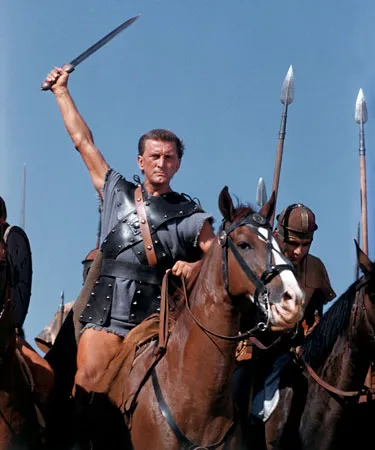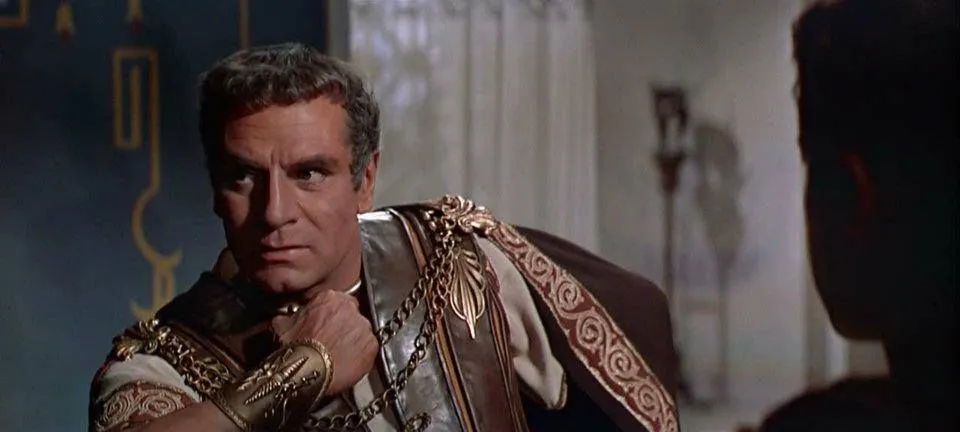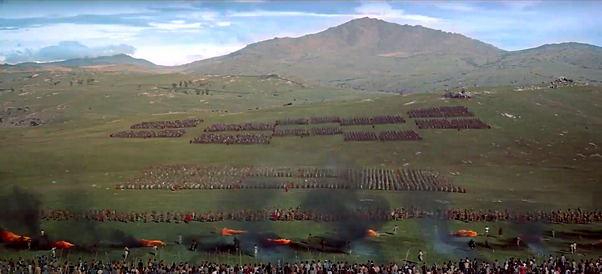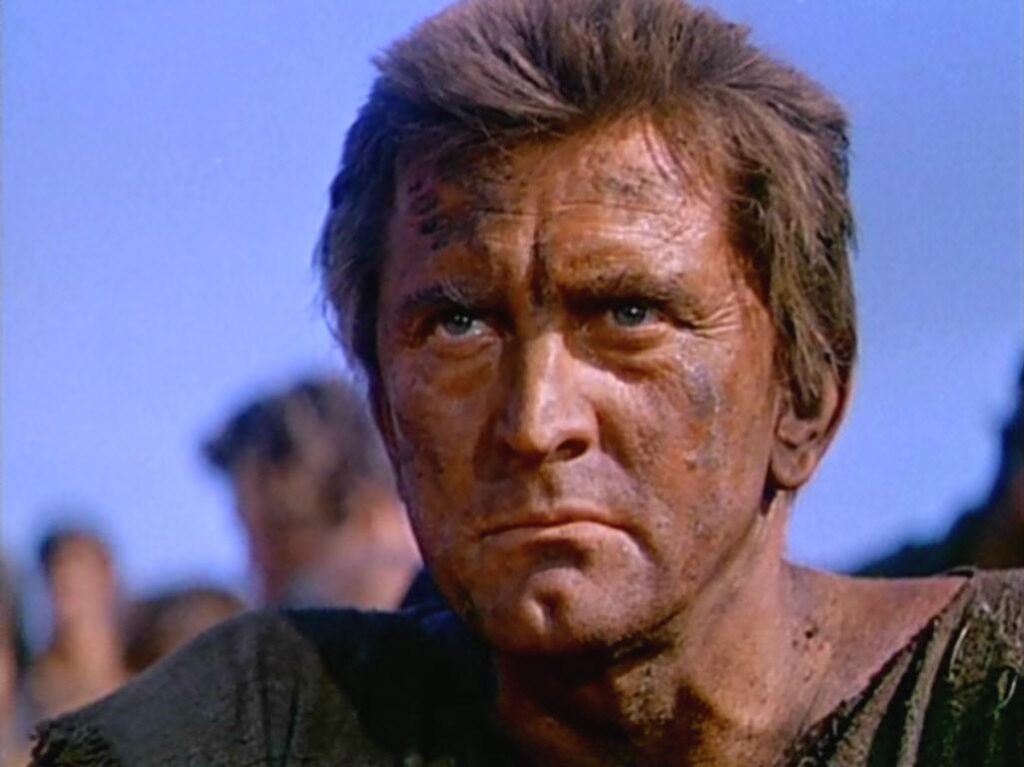Spartacus (1960)

DIRECTOR: Stanley Kubrick
CAST: Kirk Douglas, Laurence Olivier, Jean Simmons, Tony Curtis, Peter Ustinov, Charles Laughton, John Gavin
REVIEW:
Rightfully regarded as one of the best of the old sword and sandals Roman and/or Biblical epics that were in vogue in Hollywood in the 1950s and 1960s (see also the likes of The Ten Commandments, Ben Hur, etc), Spartacus exists in the same vein as the likes of Braveheart or Gladiator, blending epic spectacle on the kind of lavish grandiose scale seldom mounted, and a surprising amount of intellectual weight. Some elements are dated, but the core aspects retain their strength.
Set in 73 BC, Spartacus tells the mostly true story (albeit unsurprisingly in Hollywoodized fashion and taking its share of dramatic license) of a slave revolt that terrorized the Roman Empire. As the portentous opening narration informs us, Spartacus (Kirk Douglas) grows up as a slave in the backbreaking mines before being bought by Lentulus Batiatus (Peter Ustinov), who hopes the slave’s rebellious spirit can make a powerful gladiator (and make him a lot of money). But Spartacus hits his breaking point when his love Varinia (Jean Simmons) is spirited away towards the distant Roman estate of the wealthy and powerful Marcus Licinius Crassus (Laurence Olivier), shortly after Crassus causes an ugly incident where gladiators-in-training are forced to fight to the death for the entertainment of visiting aristocrats. Spartacus leads his fellow slaves in a riot that overruns the gladiator school, and it’s not long before they’re rampaging across Italy, burning Roman estates to the ground, looting treasure, and swelling their ranks by freeing every slave they come across, including the rescued Varinia and Antoninus (Tony Curtis), a former body servant of Crassus who runs away to join Spartacus. Meanwhile, the Roman Senate is in a uproar about finding a full-blown large-scale slave rebellion on their hands, and different factions seek to manipulate the national emergency for their own advantage, with the dictatorial Crassus matching wits in behind-the-scenes machinations and intrigues with his libertine nemesis Senator Gracchus (Charles Laughton). Ultimately, the battle between freedom and tyranny will be played out both on the battlefield and on the Senate floor, as Crassus and Gracchus both seek to use Spartacus for their own agendas, and events eventually set Spartacus and Crassus on a collision course.

At the time, the most daring thing about Spartacus—-albeit one mandated by the true story—-was that it denies its hero a conventional victory and after a formidable 187 minutes, the audience doesn’t get a tidy “happy ending” and like Braveheart’s William Wallace, Spartacus must be consoled with the hope that his ideals will outlive him. But the real battle in Spartacus is more about ideas and ideals than armies clashing on the battlefield (although there’s that too); the political plotting in the Senate with Crassus and Gracchus hatching rival intrigues is just as important as the outcomes on the battlefield, and at least as intriguing. These aren’t throwaway background plot elements, but a significant chunk of the movie’s narrative and runtime that we spend serious time on and familiarize ourselves with. Spartacus and company aren’t trying to conquer Rome or take over Italy; their only goal is to fight their way to the shore and escape back to their homelands aboard pirate ships bought with looted Roman gold, and Gracchus sees no reason not to let them go and be rid of them. But this is not acceptable to Crassus, who seeks to pull strings and orchestrate events to rob Spartacus of his escape route and force him to march on Rome, then swoop in as its savior (the better to install himself as dictator). The plot also avoids being overly predictable; Spartacus is the hero, and Crassus the primary “villain” of the story, but apart from briefly crossing paths early in the movie, things don’t settle into a more straightforward Spartacus vs. Crassus narrative trajectory until the third act (Douglas and Olivier only share three scenes, and only directly interact in two of them). Crassus represents a worthy opponent; he’s at least as smart as Spartacus, if not more so, and far more ruthless.

While telling the gist of the true story accurately enough, the movie unsurprisingly takes some generous dramatic license; the character of Spartacus’ love interest Varinia is a fictional invention, Senator Gracchus is an amalgamation of several people who lived in a different time period, and Spartacus himself has been whitewashed of any unsavory elements into a morally stalwart paradigm of virtue (in reality, Spartacus was just as happy to crucify prisoners as his nemesis Crassus), but nothing about its historical revisionism puts it out of good company with fellow “historical drama” epics like Braveheart or Gladiator (in fact, both of those arguably play faster and looser with history than Spartacus). On the other hand, yes Crassus really was the man essentially responsible for Rome’s transition from a republic to an Imperial dictatorship, and yes Crassus really did crucify reportedly as many as six thousand slaves lining the Appian Way (the crosses continued to stand by the roadside for years afterwards). The movie was politically subversive at the time, a loose adaptation of Howard Fast’s novel (with a more straightforward conventional narrative) which used the true story of Spartacus’ slave uprising as a parable for Communist themes—-power, class warfare, the communal brotherhood of the slaves versus oppressive and decadent aristocrats—-and star and executive producer Kirk Douglas played a not insignificant role in breaking the Hollywood blacklist by insisting on openly crediting blacklisted screenwriter Dalton Trumbo in the opening credits rather than forcing him to hide behind a pseudonym. A 1991 restoration by Robert A. Harris—the man who restored fellow epic Lawrence of Arabia to its original glory—pieced together the full original 187 minute runtime from various shorter versions, including ten minutes of opening, intermission, and closing music. The most significant of the restored deleted scenes is the key bath sequence cut by censors in 1960 with thinly-veiled homoerotic undertones in Crassus’ overtures to his body servant Antoninus. Not only does this scene plug some narrative plot holes—-without it, Antoninus is introduced as Crassus’ servant and then suddenly joins Spartacus’ band for no apparent reason—-it makes Crassus more complex and lends more context to his later desire for Varinia. The movie is filmed on a grand 70mm wide screen that fills the screen with sweeping shots and throws armies at each other comprising thousands of extras; perhaps the most impressive spectacle is the set-up of the climactic battle (although actually the movie still has about half an hour left after this climax point) with Roman legions marching slowly inexorably closer as neatly organized as pieces on a chessboard. Apart from this and a couple other moments of technical perfectionism, this is one of the least recognizably Kubrickian films in Stanley Kubrick’s filmography; a 31-year-old Kubrick was a studio hired gun at this point, without the clout to bring his own distinctive style he later became known for, and allegedly butted heads with star and executive producer Kirk Douglas over their differing visions for the movie (Kubrick took over the director’s chair after the original director Anthony Mann was ousted by Douglas only a week into filming).

While Spartacus retains its epic spectacle and grandeur and intellectual meat, other aspects are dated. The opening portentous narration does some heavy-handed 1950s-style Bible-thumping about the “pagan tyranny” of Rome and alludes to slavery being overthrown by “the new faith Christianity” (as if people who considered themselves Christians didn’t happily own slaves a thousand years later in the American South and elsewhere). In the end, Spartacus dies on the cross in an unsubtle Jesus parallel (in reality it’s believed he fell anonymously in battle). Some of the fight scenes like the ones at the gladiator school in the first act are clumsily-choreographed and unconvincing by modern standards, although the climactic battle scene holds up better (there’s even a blink-and-you’ll-miss-it moment where Spartacus hacks off an opponent’s arm, complete with spurting blood, apparently achieved by a one-armed extra wearing a prosthetic limb). Matte painting backgrounds of Rome look like exactly what they are, and Jean Simmons’ Varinia tends to look awfully well-coiffed and made up for a slave woman spending most of the movie as a fugitive in the countryside. Some of the supporting performances and dialogue deliveries are stiff and wooden; the worst offender is John Dall as a lackey of Crassus, whose “I do not know how I will ever be able to repay you” is laughably stilted, but John Gavin as a young Julius Caesar is as wooden as he is handsomely photogenic (the same is true to a lesser extent of Jean Simmons). On the other hand, Kirk Douglas’ Spartacus is a suitably square-jawed, cleft-chinned pillar of manful, heroic strength, making his Spartacus a larger-than-life hero in the vein of Mel Gibson’s William Wallace or Russell Crowe’s Maximus. And while the role doesn’t necessarily display a great deal of emotional range, Douglas isn’t afraid to show more vulnerable moments in tender interludes with his love Varinia, or to let us see him shed a tear. He’s offset by Laurence Olivier, who’s a delicious mix of fire and ice as his adversary Crassus, whose cunning, ruthlessness, and commanding presence makes him a formidable foe. And, while Crassus is cold and cruel, the character is lended a little more psychological depth and complexity than a generic sneering Roman aristocrat, especially in his 11th hour attempted seduction of Varinia; he wants her not merely to possess her, but as a form of victory over Spartacus. Peter Ustinov’s semi-fatuous Batiatus is a consistently entertaining scene-stealer (he won an Oscar), delighting in upstaging the other actors and trading witty banter with Charles Laughton’s Gracchus (Ustinov ghost-wrote their dialogue, which perhaps unsurprisingly is the juiciest in the movie). Jean Simmons and Tony Curtis provide adequate support. Smaller supporting roles include a rather wooden John Gavin as a pre-emperor Julius Caesar, a pretty awful John Dall, John Ireland as Spartacus’ right-hand man Crixus, Herbert Lom as an oily pirate emissary, Charles McGraw as the gladiator school’s abusive overseer, and Woody Strode in a small but key role as fellow gladiator trainee Draba.
While dated in some elements, Spartacus continues to hold up in its core elements as one of the genuine epics of Hollywood’s Golden Age, thanks to some strong performances, epic spectacle, a more intelligent screenplay than one might go in expecting, and a stirring narrative. The label of “classic” is sometimes given away too freely, but more than sixty years later, Spartacus continues to deserve it.
* * * 1/2